|
Hermaphrodites
Even as a newborn, pyschologists have found, the child will be treated differently depending on gender. If female it will be cooed at fussed over, gently touched, and smiled at for being quiet, inert, and complacent. If male, it will be more vigorously handled and any loud sounds or thrashing of limbs will be cheered as signs of masculine vigor. Later whether the child will be given a doll or a toy truck, will be cuddled and fussed over after an injury or told to shake it off, or whether the child will be scolded or praised for boistrous, risky behavior—all these, even today, will still hinge largely on gender. By the time this same individual reaches the choices and options of adult life, personality (shaped by gender influenced interactions), has already been molded into distinctly male or female modalities.
Historically, issues of gender roles have taken such bizarre twists as prohibitions against women wearing trousers, or even underpants—as any article of clothing which parted the female legs was viewed as an obscene reminder of the leg parting that accompanied sexual intercourse. But a more basic and enduring example of gender obsession occurs in the English language itself, one of many languages in which one can scarcely even address or refer to another human being without knowing that person's gender. Thus in the supermarket, mother's are routinely asked "Is it a boy or girl?" before the speaker can then go on to declare, "He is so handsome!" or "She is so pretty!" Note that both pronoun and appropriate adjective both depend on gender. Imagine the admirer's reaction if the mother replied, "Neither actually," or even, "Both!" And yet, in the delivery room, in those first heady moments following childbirth, the question of whether a child is a boy or a girl is occasionally met with a significant pause. The doctors will hurry to explain that, what with hormones and swelling and so on and so forth, the appearance of the newborns genitals can appear a little confusing. In fact, the doctors, will admit, we havent yet verified the childs gender. But rest assured, your child has a definite gender, and soon enough well know what it is.
That our modern society scarcely acknowledges this fact is an artifact of culture rather than physiology. That is, while nature herself has seen fit to grow breasts on bodies that also have penises and cunts on bodies that will have chest hair and testicles, our culture has chosen to turn a blind eye to this fact and to treat intersexed persons as defective males or defective females. In order to justify this stance, the medical profession has sought to establish a single, clear-cut criteria for gender determination. In the 19th century, physicians gleefully declared that male or female had nothing to do with external appearence or whether one did or didn't menstruate—it was, they said, purely determined by the gonads. That is, while all infants begin life as an androgynous being with no penis or vagina, they very soon develop gonads. And these gonads, by birth, will have developed into testes in the male and ovaries in the female. Therefore, anyone with testes could now be called male and so on. Of course the main problem here was that unless one could find the testicles, one did not know if the ambiguously gendered individual was female or simply a male whose balls were still hidden somewhere inside him. The only answer was surgery—still a very risky procedure in those days. To further complicate things however, it turns out that some females actually manage to be born without ovaries—and indeed without any other internal female equipment (vagina, womb, fallopian tubes)-- and develop into fairly androgynous individuals. While some males are born with bodies completely unable to respond to their own testosterone, developing into an extremely womanly individual (as seen above).
Imagine the excitement and relief then when scientific advancement gave the world a genetically based definition of male and female. Males bore the tell tale XY chromosomes and females the XX. If their gonads were not obviously detectable, or if they were missing all together, then a simple tissue sample would set the whole thing straight. But alas, individual human beings do not always conform to the rule. That is some are born XXY while others are born simply X. (A fact which has at times caused considerable consternation for the U.S. Olympic Committee, which tries to ensure that only women compete in women's events.) Here too, those seeking to clearly divide the genders were foiled.
And yet, long after it has become acceptable to acknowledge that some children are born "different", physically or mentally, and to shower them and their families with sympathy and support, children who are born differently gendered are not spoken of. A special sense of shame attaches to having a child whose genitals are not as expected. Consider that in American society, at least, most parents still opt to circumcise their male infants, no matter how painful and unnecessary just to avoid the stigma of dealing with genitals that might look different from Daddy's or from other boys in the locker room. If parents have such brainless fear of deviating from the penile norm already, if the normal male penis, uncircumcised already appears monstrous to them, imagine their horror at the sight of a more unusual deviation! A deep anxiety fills them as they ponder what the future holds in store for their little one. When a surgeon steps in and assures them that he can make it all go away, they are relieved, grateful. A flourish of the magic scalpel and no one will ever need to know. Or so the story goes.
But in modern western society, the goal has typically been the reverse to transform anyone whose gender is ambiguous (psychologically or physically) into one who will readily pass as either male or female even on their wedding night. The circular argument runs thus, everyone is born either male or female and so those who do not clearly belong to one sex or the other must be surgically altered to do so. In fact, so ingrained is this philosophy that no newborn may leave the hospital until its paperwork bears the decree (m)male or (f) female. Therefore, if the genitals are ambiguous that is if their appears to be both penis and vagina (or neither) the doctors will have to determine, through ultrasound or rectal exam, if the child does or does not have a uterus. If no uterus is found, then its on to the gonads specifically, in their later months in utero, did they develop into ovaries or into testicles? (Sometimes the gonads will be checked first, but only if they are descended sufficiently as to be external, as with testicles.)
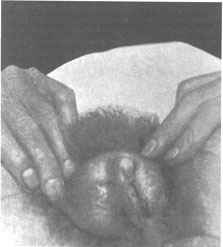 Occasionally however it is decided that although the child is biologically male (it has testicles), it should be raised as a female because its penis has been judged too small to useful for sexual penetration. (A condition known as micropenis.) It will be much better, doctors will counsel the parents, to remove the testicles and create an artificial vagina. The resultant female will never be able to have children, and will need to begin hormone treatments at puberty and for the rest of her life—but at least she will appear normal. Occasionally however it is decided that although the child is biologically male (it has testicles), it should be raised as a female because its penis has been judged too small to useful for sexual penetration. (A condition known as micropenis.) It will be much better, doctors will counsel the parents, to remove the testicles and create an artificial vagina. The resultant female will never be able to have children, and will need to begin hormone treatments at puberty and for the rest of her life—but at least she will appear normal.
Similarly, the female child whose clit is too large must also be surgically remodeled to fit expectations even though the procedure will most likely leave her unable to ever experience orgasm. But at least everything will look normal. Interestingly enough, most intersexuals say that the medical intervention they received has made them feel anything but normal. In fact most say that, even as children, surgical intervention made them feel that there must be something monstrous about them, something terrible and unacceptable that had to be remedied by cutting off part of their privates. Furthermore, they are often deeply scarred sexually. The reconstruction surgeries performed upon them in infancy and adolescence, not only remove vital nerve and muscle tissue, but they also leave a deep psychic wound—a conscious and unconscious sense of deep violation and rejection—that makes sexual intimacy awkward and painful. The real source of the problem (besides being raised by parents who were unable to accept them "as is"), is a cultural expectation that is based on the idea that only heterosexuality is normal and desirable. Thus a child born with a penis too small for penetration must be made into a penetratable female—because the idea that he/she would otherwise receive sexual gratification from oral sex or mutual masturbation was repugnant. Better to cut off his balls (barring him from any chance of reproduction), and create a pathetic, insensate excuse for a vagina. Regular hormone treatments and now he is a "she". Women with enlarged clits and tiny vaginal shafts get cut down to size and deepened for penetration. Nevermind that a large number of such vaginal inventions simply never take. Or that urinary infections will plague the patient for the rest of his/her life. All this in the name of heterosexual ideals.
Meanwhile, as intersexuals struggle to heal from the "normalizing" surgeries imposed on them, unvoluntarily, in their youth, transsexuals—those who desire gender reassignment—are jumping through hoops to convince the establishment that they should be able to change from one gender to the other. And while rubbing elbows with transexuals may embitter intersexuals who receive envying remarks ("You're so lucky—you had it taken care of for you, as a baby,"), the fact remains that the agressive push for equal rights from within the gay/transgender communities has had a truly healing impact on many intersexuals. Having grown up believing their status was too shameful even to discuss with parents and physician, many have begun to find their voice and to speak out about the cruel farce inflicted upon them and to demand a more tolerant stance toward intersexual children. But in the meantime, the medical establishment itself continues to regard sexual ambiguity as it does any other "birth defect"—as an unfortunate condition to be remedied as soon as possible. The idea of leaving well enough alone until the patient himself can decide what identity and outward appearence fits best has simply not caught on yet. The gauntlet of all those years of childhood, in which the choices usually determined by gender would simply be set aside, is too appalling for the conventional mind to consider. How would the child dress, act, refer to itself? Which bathroom would it use at school? And what kind of person would such a child grow into—a pervert? A deviant? But even if homophobia and cultural conditioning could be set aside, could any child pass through the societal obsession with gender unscathed? And would the experience be less traumatizing than the early gender reassignment of the past? Certainly surgery could be set aside until some later date (possibly to be abandoned altogether). But for the time being, gender assignment (leaving the hospital "boy" or "girl") seems to continue to be an important path for the child to follow, for its own emotional well-being. Some day, perhaps, gender stereotypes may become a thing of the past. And personality may be allowed to unfold from within, regardless of the fleshy configurations between one's legs. In such a climate, (future) intersexual children may find the freedom to explore the uniqueness of their own identity. But for now, even as they hide behind the masks of conventional identities, they remain a tantalizing reminder of what the ancient Greek philosophers claimed was the original state of all human beings— a genderless wholeness of being, completeness, with all potential contained within the self. |
 When a new baby makes the difficult and exhausting journey through its mothers vagina into the world beyond, the question relatives ask first (assuming no unusual trauma) has usually been, Is it a boy or a girl? This question, which is more important to the family than size or other features of outward appearance, will also do more to affect the childs life than any other single factor, save perhaps race or poverty.
When a new baby makes the difficult and exhausting journey through its mothers vagina into the world beyond, the question relatives ask first (assuming no unusual trauma) has usually been, Is it a boy or a girl? This question, which is more important to the family than size or other features of outward appearance, will also do more to affect the childs life than any other single factor, save perhaps race or poverty.
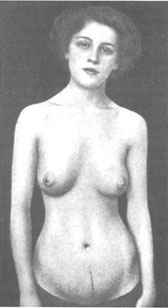 Meanwhile these differing reactions are only a small part of a whole system of social relationships which are underpinned by issues of gender—or more specifically, on the idea that men and women do and should look differently, act differently, and contribute differently to society. Although gender roles are probably more relaxed now than at any time in Western history, issues of living up to cultural gender stereotypes still cause insecurity, repression, and even deadly acts of violence. How one dresses, speaks, walks, and with whom one has sex are all determined by gender—or so our social traditions would tell us.
Meanwhile these differing reactions are only a small part of a whole system of social relationships which are underpinned by issues of gender—or more specifically, on the idea that men and women do and should look differently, act differently, and contribute differently to society. Although gender roles are probably more relaxed now than at any time in Western history, issues of living up to cultural gender stereotypes still cause insecurity, repression, and even deadly acts of violence. How one dresses, speaks, walks, and with whom one has sex are all determined by gender—or so our social traditions would tell us.
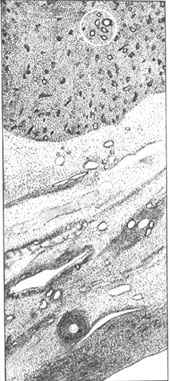 This idea that gender comes in only one of two varieties is an idea so firmly entrenched in our society that even medical professionals would hardly think to question it. But in actual fact, since time immemorial, the human race has been birthing forth children whose gender is not so clear cut. That is, as with the individuals pictured above, they bear some aspects of one gender and some aspects of the other.
This idea that gender comes in only one of two varieties is an idea so firmly entrenched in our society that even medical professionals would hardly think to question it. But in actual fact, since time immemorial, the human race has been birthing forth children whose gender is not so clear cut. That is, as with the individuals pictured above, they bear some aspects of one gender and some aspects of the other.
 Such confusions have long been a source of consternation and concern for doctors who saw themselves as charged with acurately declaring a person's true gender. The failure to spot a male clad in female seeming flesh would, they thought, lead to the horror of unchecked lust in the convent and the boarding school. Surely, they believed, male gonads would lead the owner to seduce the unwary true females by whom he was surrounded. Or, worse yet, this confusion of gender might easily lead to all manner of homosexual perversions.
Such confusions have long been a source of consternation and concern for doctors who saw themselves as charged with acurately declaring a person's true gender. The failure to spot a male clad in female seeming flesh would, they thought, lead to the horror of unchecked lust in the convent and the boarding school. Surely, they believed, male gonads would lead the owner to seduce the unwary true females by whom he was surrounded. Or, worse yet, this confusion of gender might easily lead to all manner of homosexual perversions.
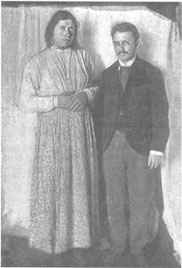 But because our society has tried long and hard to pretend that people only come in two sexual flavors, man and woman, anyone who falls outside this template has been forced to conform, mimicking one gender norm or the other. On rare occaions, such persons have sought to turn the tables on the game and exhibit themselves for wealth and fame, but usually they have been forced hide themselves away, as though they were perverts, rebels against the social order. This is hardly surprising given that women who dressed or acted like men were a threat to male property inheritance and various other penis perks. Additionally men who comported themselves like women were seen as instigators of homosexuality (as they were either men wanting to have sex with other men, or men wanting to have sex with women who themselves lusted after other female-appearing persons), and so they too were a threat to the social order.
But because our society has tried long and hard to pretend that people only come in two sexual flavors, man and woman, anyone who falls outside this template has been forced to conform, mimicking one gender norm or the other. On rare occaions, such persons have sought to turn the tables on the game and exhibit themselves for wealth and fame, but usually they have been forced hide themselves away, as though they were perverts, rebels against the social order. This is hardly surprising given that women who dressed or acted like men were a threat to male property inheritance and various other penis perks. Additionally men who comported themselves like women were seen as instigators of homosexuality (as they were either men wanting to have sex with other men, or men wanting to have sex with women who themselves lusted after other female-appearing persons), and so they too were a threat to the social order.
 Meanwhile, other cultures warmly embrace the idea that gender is non-dualistic, that it has at least three categories (male, female, other) or possibly a whole spectrum. Historically, the berdache (the male who dressed in women's clothes yet had a unique role, seperate from traditional women) existed on every continent, in a variety of tribal cultures. So-called civilized nations too had their version of the other-gendered person. In modern India, one can still be male, female, or hijra. And occasionally cultures have even sought, through
Meanwhile, other cultures warmly embrace the idea that gender is non-dualistic, that it has at least three categories (male, female, other) or possibly a whole spectrum. Historically, the berdache (the male who dressed in women's clothes yet had a unique role, seperate from traditional women) existed on every continent, in a variety of tribal cultures. So-called civilized nations too had their version of the other-gendered person. In modern India, one can still be male, female, or hijra. And occasionally cultures have even sought, through  But as straightforward as this may seem (testes=boy, ovaries=girl), the reality is much more complicated. Genetics, hormones, and various "accidents" of birth all work together to affect the gender of the child. While many feel that the ultimate test of maleness or femaleness can be determined by the gonads, or at least by the chromosomes (XX=female, XY=male) there are actually a variety of conditions which confuse the situation. For example:
But as straightforward as this may seem (testes=boy, ovaries=girl), the reality is much more complicated. Genetics, hormones, and various "accidents" of birth all work together to affect the gender of the child. While many feel that the ultimate test of maleness or femaleness can be determined by the gonads, or at least by the chromosomes (XX=female, XY=male) there are actually a variety of conditions which confuse the situation. For example:
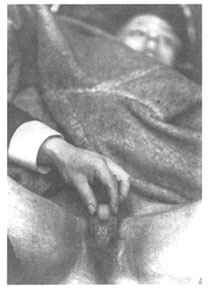 The irony is that intersexuals don't always follow the blueprint that parents and doctors carve into them. For example, while the feminine shemales of AIS syndrome lust after men, the women so clumsily alterred to equip them for penis entry, may simply prefer other women. Many other intersexuals are too burdened with shame and confusion to bother with partners of either gender.
The irony is that intersexuals don't always follow the blueprint that parents and doctors carve into them. For example, while the feminine shemales of AIS syndrome lust after men, the women so clumsily alterred to equip them for penis entry, may simply prefer other women. Many other intersexuals are too burdened with shame and confusion to bother with partners of either gender.